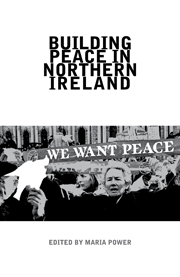Book contents
- Frontmatter
- Contents
- Acknowledgements
- Contributors
- 1 Introduction: Peacebuilding in Northern Ireland
- 2 Understanding the Role of Non-aligned Civil Society in Peacebuilding in Northern Ireland: Towards a Fresh Approach
- 3 The Role of Civil Society in Promoting Peace in Northern Ireland
- 4 The Contribution of Integrated Schools to Peacebuilding in Northern Ireland
- 5 Providing a Prophetic Voice? Churches and Peacebuilding, 1968–2005
- 6 ‘Peace Women’, Gender and Peacebuilding in Northern Ireland: From Reconciliation and Political Inclusion to Human Rights and Human Security
- 7 Encumbered by Data: Understanding Politically Motivated Former Prisoners and the Transition to Peace in Northern Ireland
- 8 Loyalism and Peacebuilding in the 2000s
- 9 Civil Society, the State and Conflict Transformation in the Nationalist Community
- 10 Examining the Peacebuilding Policy Framework of the Irish and British Governments
- 11 Building Peace and Crossing Borders: The North/South Dimension of Reconciliation
- 12 Peace Dividends: The Role of External Aid in Peacebuilding
- Index
8 - Loyalism and Peacebuilding in the 2000s
- Frontmatter
- Contents
- Acknowledgements
- Contributors
- 1 Introduction: Peacebuilding in Northern Ireland
- 2 Understanding the Role of Non-aligned Civil Society in Peacebuilding in Northern Ireland: Towards a Fresh Approach
- 3 The Role of Civil Society in Promoting Peace in Northern Ireland
- 4 The Contribution of Integrated Schools to Peacebuilding in Northern Ireland
- 5 Providing a Prophetic Voice? Churches and Peacebuilding, 1968–2005
- 6 ‘Peace Women’, Gender and Peacebuilding in Northern Ireland: From Reconciliation and Political Inclusion to Human Rights and Human Security
- 7 Encumbered by Data: Understanding Politically Motivated Former Prisoners and the Transition to Peace in Northern Ireland
- 8 Loyalism and Peacebuilding in the 2000s
- 9 Civil Society, the State and Conflict Transformation in the Nationalist Community
- 10 Examining the Peacebuilding Policy Framework of the Irish and British Governments
- 11 Building Peace and Crossing Borders: The North/South Dimension of Reconciliation
- 12 Peace Dividends: The Role of External Aid in Peacebuilding
- Index
Summary
Introduction
It could be argued that the Northern Irish conflict has been successfully settled by antagonistic groups entering a process of dialogue with one another. Yet, observers point that the process as it has been designed failed to develop a culture of democracy involving such mechanisms as debates, discussions, disagreement, compromission and cooperation. Besides, recent events led Wilson to conclude that the rationales provided by the paramlitaries still remain meaningful for many. Some observers pushed the argument further by stating that a link existed between the way the peacemaking process had been designed and the increase in intercommunal tensions and violence. For example, Wilson and Wilford noted in 2003 that ‘the sobering conclusion must be that at best the agreement has had a neutral effect on communal division – and, at worst, that perversely it has exacerbated it’. The thrust of their argument was that some of the leading principles of the various peace agreements (notably the 1998 Good Friday Agreement and the 2006 St Andrews Agreement) did not question the segregationist culture prevalent in Northern Ireland.
In the same vein, I contend that the policy-making framework in which strategies aiming at building peace have been designed has had an impact on the efficiency of the peace process in general. To all appearances, peace has not been stabilised. Different forms of violent or aggressive behaviours continue to exist. If traditional paramilitary activities lessened in the 2000s, Hansson stated in 2005 that ‘young people in interface areas continue to be involved in sporadic outbreaks of violence or disturbances’.
- Type
- Chapter
- Information
- Building Peace in Northern Ireland , pp. 131 - 153Publisher: Liverpool University PressPrint publication year: 2011
- 2
- Cited by



